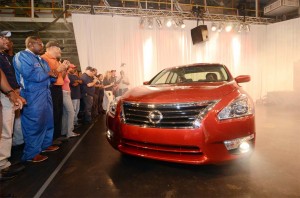The deeper you go into the South the less friendly it has traditionally been to unions. But the United Auto Workers Union is hoping that by targeting Nissan’s big assembly plant in Canton, Mississippi it finally can crack the door and get a foothold into the growing network of foreign-owned automotive assembly plants.
Since taking the helm at the once all-powerful UAW in 2010, President Bob King has made it a top priority to organize the so-called “transplant” assembly lines, a goal his predecessors have failed to achieve since Honda opened its plant in Marysville, Ohio three decades ago.
The union has reportedly been looking at several possible targets that show signs of being more willing to consider an organizing drive, including the new Volkswagen plant in Chattanooga, Tennessee. But it appears leaders see their brightest opportunity in Canton and may take the unusual step of pitting workers there against employees at Nissan’s other assembly plant in Smyrna, Tennessee.
Some say the latest push could be a make-it-or-break-it effort for the UAW which has seen its membership plunge by nearly 75% since reaching its 1.5 million peak in the late 1970s, at a time when foreign makers like Nissan, Toyota and Hyundai were not yet a major force in the American marketplace.
Today, the foreign-owned brands generate more than half of all U.S. sales. More significantly, they continue to ramp up their local production base, Nissan among many now producing the majority of their products sold in the States in North American assembly plants.
But until now, the UAW has only been able to organize a handful of the transplants – and then only facilities launched as joint ventures between U.S. and Japanese makers. Worse for the union, the NUMMI joint venture between Toyota and General Motors in Fremont, California has closed and Mazda is abandoning its joint venture with Ford in suburban Detroit. Only the Mitsubishi plant in Normal, Illinois, originally a joint venture with Chrysler, remains unionized.
It’s certainly not because the union hasn’t tried to organize the transplants. In fact, Nissan has been a familiar target though workers in Smyrna have repeatedly rebuffed previous drives, twice voting against the UAW by more than two-to-one margins.
What may work into the union’s plans is the fact that Nissan, like other foreign makers, pays different wages depending on the plant, usually reflecting prevailing local labor costs. The UAW has long made it a policy to demand that the workers it represents all receive the same wages and benefits.
(That policy, however, was revised in 2007 to permit Detroit’s Big Three to bring in so-called “new hires” at a lower rate.)
While Nissan doesn’t publish its pay scale it is believed to be paying about $25 an hour to its Canton workers, about $1.50 an hour less than in Smyrna. Whether that will be enough to provoke serious dissent remains to be seen, especially since it is about $10 an hour more than prevailing Mississippi wages.
“Nissan’s wages and benefits are competitive and Nissan has never laid off a single employee in the nearly 30 years it’s had manufacturing operations in the U.S.,” said spokesman David Reuter, noting another selling point the company is using as it presses to remain non-union.
For its part, UAW leaders insist the automaker is pushing up to and perhaps beyond the boundaries of what is fair and legal when it comes to resisting a union organizing drive.
In a statement, UAW President King insisted Canton employees are now being subjected to daily meetings designed to counter the union’s push. “Workers have had to endure months of meetings during work time where they only hear the employer’s anti-union views.”
Nissan clearly has reason to try to avoid a confrontation that might disrupt the launch of one of its most critical products ever. Like Smyrna, Canton is now producing the new Altima – with which Nissan believes it now has a strong shot of toppling the long-time king of the midsize hill, the Toyota Camry.
To get there, Nissan is pulling out all the stops, including ramping up production including the use of extensive overtime. Several sources note that this has been putting a severe strain on workers that could encourage them to consider inviting in a third-party negotiator like the UAW.
Company officials downplay that concern, though during the Altima production launch in Smyrna, last month, Bill Krueger, Vice Chairman of Nissan Americas, alluded to the strain when talking about the addition of a new third shift.
“It allows us to (no longer) burden our workforce with 11 and 12-hour shifts,” something he noted results “in the fatigue factor when you get into extensive overtime for a sustained time.”
Most observers suggest the UAW has a long, tough road ahead, especially if Nissan continues to resist the organizing drive. But as the hallmark of union president King’s tenure, few expect to see the UAW back down if it sees any opportunity at all.

